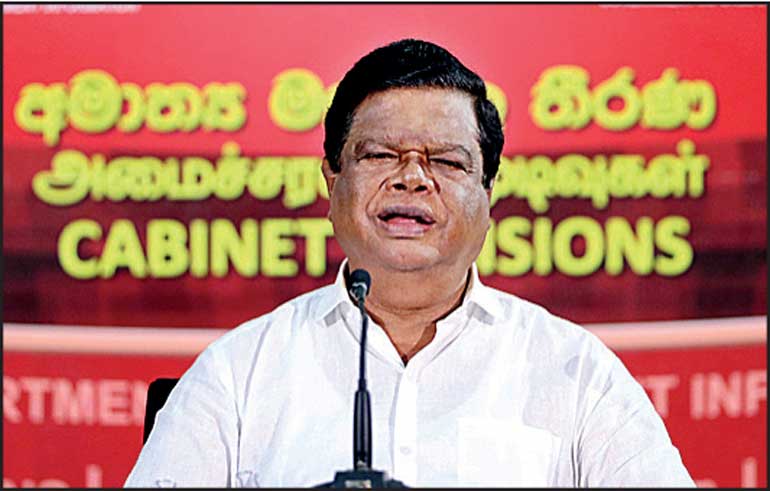Thursday Feb 19, 2026
Thursday Feb 19, 2026
Wednesday, 14 August 2024 00:18 - - {{hitsCtrl.values.hits}}

Cabinet Co-Spokesman and Minister Bandula Gunawardena
Ahead of the upcoming Presidential Election, the Cabinet of Ministers on Monday approved a series of measures to overhaul the salary structure in the public sector, set to take effect next year.
The proposals, presented by President Ranil Wickremesinghe in his capacity as the Finance, Economic Stabilisation and National Policies Minister, were approved and will be implemented through the 2025 Budget.
“The overall salary adjustment will cost around Rs. 200 billion a year,” Cabinet Co-Spokesman and Minister Bandula Gunawardena said yesterday.
Speaking during the weekly post-Cabinet meeting media briefing, he assured that the initiative is within the parameters of the IMF agreement and will be rolled out in phases within the existing tax framework from 1 January 2025 considering the fiscal space.
(CH)
“The minimum monthly salary will be adjusted from a minimum of 24%-35% while taking the gross salary to Rs. 55,000. This salary revision is significant,” he added.
However, the Cabinet Co-Spokesman said implementation of the new salary and allowance methodology excludes trading State companies and banks.
The move follows the Cabinet’s earlier approval on 27 May to appoint a specialist committee tasked with reviewing and recommending revisions to salaries, wages and other remunerations across all sectors of the public service.
The committee, led by former Secretary to the President Udaya Senevirathne has since engaged with public officers and major trade unions, culminating in an interim report that has shaped the current proposals.
In 2023, the country had nearly 1.4 million public servants and the salary bill was Rs. 939 billion, whilst the pension bill was Rs. 372 billion.
The Committee has also recommended reducing the public sector cadre to below one million by 2030.
Key proposals approved by the Cabinet include; categorisation and recruitment, cost of living allowance, digitalisation and staffing, medical insurance and pensions, efficiency measures and scientific staff study.
Gunawardena also said the cost of living allowances of active employees will be consolidated and increased to Rs. 25,000, whilst the pensioners will only receive 50% of it.
He assured that these measures have already been taken into consideration to be included in the upcoming Budget 2025.
“These measures represent a substantial reform of the public sector, aimed at modernising and streamlining Government operations while ensuring fair compensation for the workforce,” he added.
When asked if these were another attempt to broad base voter turnout ahead of the election, Gunawardena categorically stated that these measures and committees were discussed and appointed way ahead of the polls and thus it has nothing to do with the election.
The raft of measures include:
• Categorisation of all designations in the entire public service into four levels and grouping them into sub-categories of recruitment, based on Sri Lanka Qualifications Framework (SLQF) and the National Vocational Qualification (NVQ) as well as the relevant role, responsibility of the employment and the considering the ability to attract and sustain especially skilled employees in special employments.
• Following appropriate selection methodologies based on SLQF and NVQ as fundamental recruitment qualifications even for primary service categories as per service requirement.
• Recruitments to be made to all other service categories through formal competitive examinations and interviewing methods.
• Accordingly, revising the existing approved service minutes appropriately soon.
• Payment of a monthly cost of living allowance of Rs. 25,000 for all the Government employees (subject to revising once in every three years) considering the year 2025 as the base year, consolidate various adjustments and allowances already added.
• The minimum initial monthly salary of the Government service to be escalated from a minimum 24%-35%, while taking the gross salary as Rs. 55,000 with cost of living allowance and adjusting and calculating the initial salary of all other designations accordingly.
• Implementation of this new salary and allowance methodology for all government institutions excluding trading state companies and banks.
• Taking measures to limit the total staff of the public sector by 2030 to one million (1,000,000) or lesser.
• Introduction of e-governance from the electronic systems accordingly in every sector in the entire public service within 03 years through digitalisation and automation and pioneering the public investment for that.
• Implementation of a medical insurance scheme that awards attractive benefits with a monthly minimum contribution of Rs. 1,000 including for all employees and pensioners of the government sector with effect from January 2025.
• Obtaining services following precise methodologies to maximise the efficiency to minimise the Government cost through methods such as outsourcing as far as possible.
• Implementation of the restructuring program for State departments/corporations/statutory institutions by initialising them as Public Liability Companies listed in the stock market.
• Performing a precise work study, taking actions in the year 2025 to scientifically study on the entire State sector staff and services.
• Accordingly, all public employees should be furnished with performance indicators and the salary increments should be awarded based on their progress.
• Awarding the claimed salary increments for government officers retired prior to the year 2020 and clearing their relevant salary anomalies by revising their pension.
• From January 2025, pensioners will be given 50% of the cost of living allowance given to the public employees engaged in active service.
• Subject to management of this expenditure within the existing tax policy itself, implementation of this method of salary and implementation of the proposed method of salary with effect from 1 January 2025 considering the State finance space as well.